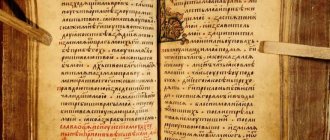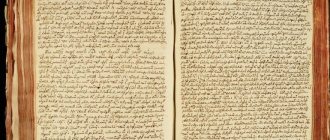Text of prayer Psalm 142
The author of the text of Psalm 143, King David, presented the work in Hebrew. At the moment, the prayer has been translated into different languages of the world.
In Church Slavonic with accents
A psalm to David, when his son Absalom persecuted him.
1 Lord, hear my prayer, inspire my prayer in Your truth, hear me in Your righteousness
2 And do not enter into judgment with Your servant, for no one living will be righteous before You.
3 Because the enemy has driven away my soul, he has humbled my life to eat, and he has made me sit in the dark, like dead ages.
4 And my spirit is faint within me, my heart is troubled within me.
5 I have remembered the days of old, I have learned in all Your works, I have learned Your hand in all that I have made.
6 I lift up my hands to You, my soul, like a waterless land to You.
7 Hear me quickly, O Lord, my spirit has perished; do not turn Your face away from me, and I will become like those who go down into the pit.
8 I heard that in the morning show me Thy mercy, for I have trusted in Thee. Tell me, Lord, I will go the other way, because I have taken my soul to You.
9 Deliver me from my enemies, O Lord, I have fled to You.
10 Teach me to do Your will, for You are my God. Your Good Spirit will guide me to rightness on earth.
11 For Thy name's sake, O Lord, live me, and through Thy righteousness bring my soul out of sorrow.
12 And by Thy mercy Thou shalt consume my enemies, and destroy all my afflicted souls, for I am Thy servant.
In Russian
Psalm of David when he was pursued by Absalom his son.
1 Lord! Hear my prayer, heed my prayer according to Thy truth; hear me according to Your righteousness
2 And do not enter into judgment with Your servant, for no one living will be justified before You.
3 The enemy pursues my soul, he trampled my life into the ground, he forced me to live in darkness, like those long dead,
4 And my spirit became faint within me, my heart grew numb within me.
5 I remember the days of old, I meditate on all Your works, I consider the works of Your hands.
6 I stretch out my hands to You; my soul is drawn to You, like a thirsty land.
7 Hear me quickly, O Lord: my spirit fails; do not hide Your face from me, lest I become like those who go down to the grave.
8 Grant me early hearing of Your mercy, for I trust in You. Show me, Lord, the path I should follow, for I lift up my soul to You.
9 Deliver me, O Lord, from my enemies; I come running to You.
10 Teach me to do Your will, for You are my God; May Your good Spirit lead me to the land of righteousness.
11 For thy name's sake, O Lord, quicken me; For the sake of Your righteousness, lead my soul out of adversity.
12 And according to Your mercy destroy my enemies and destroy all who oppress my soul, for I am Your servant.
Why read Psalm 142
The Psalms are so respected in Orthodoxy that they are often published as a separate book. In former times, monastics learned it completely by heart. And today believers are advised to know at least a few chapters from the Bible by heart. This gives a great advantage - you can call upon God’s help anywhere. Psalm 142 in the Russian Orthodox Church has liturgical application:
- Used at Great Compline;
- Read at Small Compline;
- Included in the six psalms;
- Sounds during the ceremony of unction (blessing of oil).
The Six Psalms is part of Matins - the service is held in the evenings, and chapters from the Psalter are heard in the dark, only the reader holds a lit candle in his hand. This is done so that the attention of believers is focused only on the words of repentance.
History of writing
The author of the song of praise is King David. The text was written during difficult times for the king, when there was a split in the family. Then David's son Absalom revealed all his anger and greed. The young man killed his brother for the evil he had done to Absalom's sister. Despite his son’s crime, David forgave him and asked him to return home. But the kindness was not appreciated, and Absalom began to gather an army against his father. David fled from the traitors.
The meaning of the psalm
The meaning of Psalm 143 is that the one who prays calls on God. He is in a difficult situation - this is not only a spiritual situation. External enemies threaten to attack; at that period of his life, King David feared for his life. But first of all, he asks the Lord not for physical salvation, but for forgiveness and mercy. He feels uncomfortable away from the promised land; here it symbolically represents paradise, from which man was expelled for his sins.
Not a single living person, as King David rightly asserts, can present to God deeds worthy of His goodness. No righteous person can justify himself by his virtues. It is also common for a person to attribute his own weaknesses to the Lord, find various tricks, and make excuses. David appears before the Creator in a state of spiritual humility. This is a view of the world when a believer first of all thinks not about himself, but about how to please God.
Psalm 143 contains many beautiful epithets and vivid images. The psalmist compares his soul to dried up earth. Even if there are grains of goodness in it, they cannot sprout without the life-giving power of the Holy Spirit, which can only be found in repentance and prayer.
- King David sets an example of how Christians should fellowship with the Lord. He does not cheat, does not try to bargain with the Almighty. He does not demand a cozy, comfortable life in exchange for good deeds, as many modern believers do. He cries out to heaven for the Lord to look at him, because without God he does not feel fully alive.
- With all the strength of his soul, the author seeks the path to his heavenly Master. People can't always see the straight path. Although we know that the path to salvation is Christ, the voice of conscience can be drowned out by a multitude of sins.
- The laws that were given to Moses do not save. After all, people simply do not have enough strength to comply with all of them, which is why the Savior’s sacrifice on the cross was required. The only source of all good things is the Lord.
Interpretation of Psalm 143
In desperation, the psalmist turned to the Lord. The author looks for help everywhere, but cannot trust anyone except God. He is the king's protector.
Verses 1-5: Petitions to the Lord for protection. The author asks to punish his persecutors, his enemies, because of whom David escaped from the throne. God's protection is needed, because the danger is mortal. In difficult moments, the king remembered the mercy of the Lord.
Verses 6-8: Even during the silence, David did not give up. He knows the true Love of the Lord for his children. And every minute the king pronounces prayers of petition.
Verses 9-11: The author asks for deliverance from traitors and enemies. David asks to teach him to live correctly, according to the instructions and commandments of God. Cleansing the soul and body from sins and misdeeds.
Interpretation
There are several published printed interpretations on the entire Psalter in general and specifically on 142 cantos.
From the first line it becomes clear that the author is desperate and frantically asks the Lord for help. The words “Lord, why don’t you hear me?” they talk about David’s despair, that he is looking for and cannot find an answer. He calls the Lord, calls Him his Protector and Comforter, speaks of his own grief, of the darkness into which he has fallen. He asks the Creator for mercy and protection, because only God can destroy all enemies and once again raise the king to his throne.
David asks the Lord for help, mercy and protection
The one who prays clearly understands how incompetent he is before the Almighty Creator. The psalm clearly reflects the idea that the law (the set of rules of the Jews) cannot save a person, but only the love of God and His mercy is capable of this. In the New Testament, the same idea can be traced in Jesus Christ, as well as in the letters of the Apostle Paul.
Reading the text, you can notice how the author moves from absolute confidence in the Lord to despair. He does not hold back his expressions, his soul grieves and screams. David, despite the many miracles that accompany his life, also experiences and fears his enemies.
About other psalms:
- Psalm 89
- Psalm 19
- Psalm 53
Reading rules
Today you can find the text of the prayer Psalm 143 in Russian. The song has been translated into more than 100 languages of the world. In churches, clergy read the text in Church Slavonic. It is part of the Six Psalms. If you want to use the text at home, it is better to read Psalm 142 in Russian. If you choose a song for home reading, then there are no special rules. It is advisable to read every day during morning and evening prayers.
( 2 ratings, average: 5.00 out of 5)
Interpretation of the divine text 142 songs
There are a number of published interpretations specifically on Psalm 143, and interpretations of the collection in general. The opening lines immediately make it clear that the author is overcome by despair, except God, he has no one to ask for help, and the words addressed to Him that He does not hear him indicate a desperate situation. God for him is the Comforter and Protector, the king tells Him about his grief, about the gloomy state in which he finds himself. The exile prays for his protection, for the return of his former regalia and the punishment of his enemies.
Due to numerous requests from readers, we have prepared an “Orthodox Calendar” application for smartphones. Every morning you will receive information about the current day: holidays, fasts, days of remembrance, prayers, parables. Download for free: Orthodox Calendar 2022 (available on Android)
The person praying is well aware of his inadequacy before the Creator, and the psalm clearly reflects the idea that it is not the law that saves, but only God’s mercy and the Lord’s love for man. This thought of David finds its continuation on the pages of the New Testament.
The text very subtly shows the facets of the author's transition from undoubted confidence in the power of God to bitter despair. This is shown by unrestrained expressions and a bitter cry from the soul. David is very afraid of his enemies, although his fate is simply filled with all sorts of miracles.
How to read correctly
Considering that the psalm is available in Russian and Church Slavonic, you can choose the most convenient option for yourself. However, it is better to use the Russian translation when studying or reading at home. In churches it is in Church Slavonic. Usually the reading is included as part of the Six Psalms, and the text is read during the evening service among the penitential chapters.
There are no clearly limited special rules if you read for yourself. If only it was in the morning or evening.
In what cases do they resort to Psalm 143?
A person can recite this song of David in the following situations:
- hostile or unfriendly environment;
- overcomes many problems;
- scary to think about the future;
- powerless in front of enemies;
- complete despair;
- the desire to cry and be consoled.
It is not forbidden to read the psalm at the time of prayer. You can contact him every day. The main thing is complete concentration on the sentences of the text and sincerity.
Interpretations of the Holy Scriptures. Commentaries on Ps. 142:8
I hear Thy mercy upon me in the morning. This means the former resurrection of the Lord in the morning; or, perhaps, he prays that the morning resurrection of Christ, by which we have been pardoned, will come.
Lord tell me the way, I will go there. He prays that he may be worthy of the gospel teaching.
“I hear Thy mercy upon me in the morning, for I trust in Thee.” Show me Your love for mankind, says the Prophet, and let me not be deceived in my hope. By the word “morning” he means here: soon.
“Tell me, O Lord, the way, and I will go to it, for I have taken my soul to You.” Be my leader, says the Prophet, and show me the right path; for, having renounced my soul from everything human, I present it to You, Master.
I hear you show (tell) me your mercy in the morning; like I trust in You.
Proclaim, he says, and reveal, Lord, soon (for this means: in the morning), that You will show me mercy, so that even before testing Your mercy through experience and deed itself, I could be comforted by this news alone and the promise of Your mercy. On what basis can You reveal to me that You will show me Your mercy? On this, he answers that I completely trusted in You: such trust from the bottom of my heart can soon attract the mercy of God.
According to Athanasius, he prays for the approach of the morning resurrection of Christ, by which we have been pardoned.
Tell me , O Lord, the way in which I will go, for I have taken my soul to You.
Why does David ask here that the Lord reveal to him the way of salvation, while both the natural law and the written law teach about this? We answer that David asks this, or because the natural law written in the conscience is overwhelmed and covered with sin - for this, he says, I need it to be renewed by Your grace and Your instruction; or because a person does not know many useful subjects; which is why David here asks God for the immediate discovery of them. This is why Paul writes: for we do not know what we ought to ask (Rom. 8:26). To You, he says, I strive and cleave: therefore, show me the path of salvation, along which, walking without sin, I can come to You.
The same Athanasius: David prays for the proclamation of the Gospel teaching to him. Golden-speaking: I have raised my soul to You, which means: I rush to You, I look at You.
Art. 8-10 I heard you show me your mercy in the morning, because I trusted in you: tell me, O Lord, the way, where I will go, because I have taken my soul to you. Deliver me from my enemies, O Lord, I have come to you. Teach me to do your will, as you are my God: your good Spirit will guide me to rightness on earth.
I wait for help from You, like a thirsty land for rain. Grant me Your mercy and deliver me from my enemies
“It’s too early to hear mercy” - to see an ambulance. – “Show me the path along which I should go”, “teach me to do Your will”, “Let Your good Spirit lead me to the land of righteousness” - synonymous expressions. Teach me, Lord, to steadfastly follow Your commandments, so that I may be worthy to dwell in that land (Palestine), which You have appointed only for the righteous.
Source: https://bible.optina.ru/old:ps:142:08




